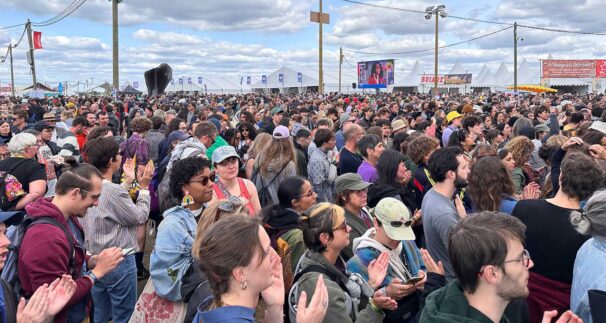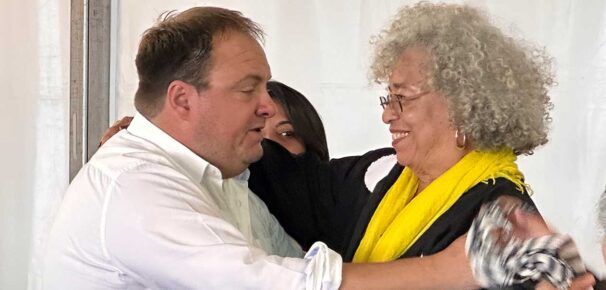
PARIS—“Do I really have to answer that question? I’m certainly not voting for the person leading the Republican Party.” That was the response of communist icon Angela Davis when a journalist asked about her intentions for the 2024 U.S. election at the festival of l’Humanité, the newspaper of the French Communist Party, this weekend.
The festival—officially called La Fête de l’Humanité—drew a crowd of 500,000 people for three days of music, culture, and politics to a former airbase in the southern suburbs of Paris. Davis, the featured guest, was making her third appearance. The first was in 1973 as part of a world tour after winning her freedom, the second in 1991 against the backdrop of the crisis of socialism worldwide.
“This is a reunion for us, many of you fought for my freedom over 50 years ago,” Davis told the tens of thousands who congregated at the Agora stage to greet her Saturday. “I remain forever grateful to the people of this country who became involved in the struggle for my freedom.”

It wasn’t just the movement veterans who came out to hear her speak, though; the overflow crowd that filled the festival grounds was made up of mostly under-30s. Every generation in France, it seems, knows the name and story of Angela Davis.
They were eager to hear directly from Davis for themselves, interested in getting the views of one of the world’s most well-known Black woman activists and intellectuals. She didn’t disappoint—fielding questions on topics ranging from history to radical feminism to the fight for Mumia Abu-Jamal’s freedom. Her remarks on how the left in the U.S. is engaging in the upcoming elections appeared to have people listening most intently.
Engaged in their own prolonged fight against the fascist danger of the National Rally party and having just experienced the coup carried out by President Emmanuel Macron and far-right leader Marine Le Pen in their own country, the global threat posed by another Donald Trump administration is top of mind for many in France right now. They are also curious about whether U.S. voters will actually put a Black woman in the White House.
“When Obama was elected, that was a very important victory,” Davis said when asked about the advance of Black political figures in the U.S. “It was not a victory in relation to what he actually accomplished during his presidency, but rather what was significant was that young people organized and accomplished something that was considered to be impossible.
“There were many at that time who didn’t think it was possible to elect a Black president, but the people—young people especially—refused to believe that. They struggled and were victorious, demonstrating that when we organize, we can win.”
A similar dynamic has been sparked by the entry of Kamala Harris into this year’s race for the White House, Davis said. The point of winning, however, is “not to put people into office only because of their race or gender,” she cautioned.

“When we engage in electoral politics, it can’t be just because a particular individual is running for office,” Davis told the crowd, “it is to enlarge the terrain of mass struggle, to guarantee a space for the trade union movement to win victories, for the women’s movement to win victories, for people of color to win victories, for working and poor people to win victories.
“That’s why we urge people to vote, isn’t it?” she asked before turning to the audience with a smile and saying, “You know that here in France for sure.”
Referencing the struggle to save democracy from Macron and Le Pen, Davis said of the French people, “You—especially you—understand the necessity of pushing back against the ultra-right.”
Though she said voters should not be motivated by race or gender considerations alone, Davis emphasized the historical importance of Harris being the Democratic candidate.
Johanna Fernandez, associate professor of history at Baruch College of the City University of New York and editor of Writing on the Wall: Selected Prison Writings of Mumia Abu-Jamal, who appeared on stage with Davis, agreed.
“Black women are so marginalized in society that Kamala’s candidacy means something spiritually to Black women.
“But when you reach that level,” nominee of one of the two major parties, “you have to be the face of capitalism, militarism, and neo-colonialism.” Harris, Fernandez warned, “has told us she will be that face, that she will build the most lethal military apparatus ever.”
As dangerous as that reality is, however, she said, “There’s more to think about: Harris is not a fascist, and the other person running for president is.”
That’s why, Davis said, there’s “no question about who progressive people and people who identify with radical change will vote for” in the U.S. election.
Trump, whom Davis never mentioned by name, must be defeated, but getting Harris into office isn’t the end of the road.
She encouraged her listeners to think of voting as a collective and strategic act—in their own struggles in France as well as when they’re analyzing why the labor movement, communists, and the left in the U.S. urge a vote against Trump and for Harris.
“It’s not just about electing Kamala Harris,” Davis again said, it’s about opening space for “those of us who are more radical than Kamala Harris to put anti-capitalist and anti-racist programs forward” and increase the pressure for change, “especially in the first place when it comes to the genocide being inflicted on the people of Palestine.”
That radicalism was another prominent component of Davis’ message to festival attendees. A moderator asked Davis whether she still saw Marxism as a useful ideology for understanding the world. The answer: a short and simple “Yes.” She was then questioned about her many years as a leading figure in the Communist Party USA and whether her politics had become less radical since she left the party in 1991.
“I am still a communist—with a small ‘c’ rather than a large ‘C’. Although I’m no longer a member of the CPUSA, I consider myself a communist, and I work with the Communist Party and everyone who resists capitalism, patriarchy, and racism,” Davis declared. “We have to challenge capitalism; it is the enemy of all progressive movements and struggles in the world.”
Linking the fight to elect the first woman U.S. president and her commitment to anti-capitalism, Davis said she will always struggle for a specifically “anti-capitalist feminist movement.” Radical feminism cannot be content with “wanting women to reach the same stage as men, what we used to call bourgeois feminism or today is sometimes called ‘glass ceiling feminism.’
“We don’t identify with those women who’ve almost reached the top of the hierarchy; we have to identify with working-class women, Black women, poor women, women of color. As the women in Brazil say, ‘When Black women move forward, the entire world moves forward’—tout le monde!”

Her message was immediately taken up by the crowd. As Davis finished her speech, a spontaneous feminist procession formed up and began a march through the winding streets of the massive festival grounds. As it passed down Nelson Mandela Street, hundreds swelled the ranks. By the time the parade reached the Village du Monde, the Fête’s international village, it was thousands-strong.
“Angela Davis said very well that patriarchy, racism, and sexism work together,” said one marcher, Sara, 44, who works in child protection services. “We must fight to eliminate these three things. It’s the same with the environment, women, and children, who are taken and thrown away! It’s the whole system of capitalism that must be overthrown.”
Speaking to People’s World amidst the festival events, Davis said, “The French people and the people of the U.S., just like many around the world, are engaged in a fight—a fight against racism, anti-immigrant hate, and patriarchy—really a fight against fascism.
“And just as we’ve always done, we stand united in this fight, in solidarity. We share experiences, strategies, and tactics. And being back here at La Fête de L’Humanité, I’m reminded again of the strength we all give each other whenever we’re together.”
Correction: Part of a statement made by Johanna Fernandez was originally attributed to Angela Davis. That error has been corrected.










